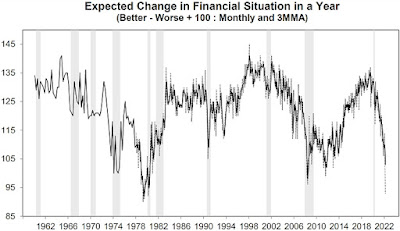Consumer Sentiment: Final Results for March 2022
The University of Michigan's Index of Consumer Sentiment (ICS) - Final Results for March 2022 was released today:
Predicted: 60.0
=========
=========
From today's report:
Predicted: 60.0
- Actual: 59.4
- Change from Previous Month: -5.414% (-3.4 points)
- Change from 12 Months Previous: -30.035% (-25.5 points)
=========
- Final ICS Reading for February 2022: 62.8
- Final ICS Reading for March 2021: 84.9
=========
From today's report:
"...Consumer Sentiment remained largely unchanged in late March at the same diminished level recorded at mid month. Inflation has been the primary cause of rising pessimism, with an expected year-ahead inflation rate at 5.4%, the highest since November 1981. Inflation was mentioned throughout the survey, whether the questions referred to personal finances, prospects for the economy, or assessments of buying conditions. When asked to explain changes in their finances in their own words, more consumers mentioned reduced living standards due to rising inflation than any other time except during the two worst recessions in the past fifty years: from March 1979 to April 1981, and from May to October 2008. Moreover, 32% of all consumers expected their overall financial position to worsen in the year ahead, the highest recorded level since the surveys started in the mid-1940s. The combination of rising prices and less positive income expectations meant that half of all households anticipated declines in inflation-adjusted incomes in the year ahead. The sole area of the economy about which consumers were still optimistic was the strong job market. Consumers anticipated in March that during the year ahead it was more likely that the unemployment rate would post further declines than increases (30% versus 24%).
Strong job growth will continue to put upward pressures on wages, resulting in higher income and stronger job prospects. This strength will then act to expand consumer demand and ultimately lead to another cycle of price and wage increases. These factors represent the necessary (but not sufficient) conditions for the development of inflationary psychology as a self-fulfilling prophecy. Prevention of inflationary psychology is much less costly before it becomes ingrained in the economic behavior of consumers and firms. Confidence that economic policies will resolve the problem is essential. Unfortunately, half of all consumers unfavorably assessed current policies, more than three times the 16% who rated them favorably. Making the situation even more difficult, policy makers need to take account of two unusual sources of economic uncertainty, one rather minor (the new covid variant), and a major source of continued economic disruption (the Russian invasion of Ukraine)..."
=========
=========
The ICS uses a 1966 baseline, i.e. for 1966, the ICS = 100. So any number that is below the 1966 baseline of 100 means that the folks who were polled recently aren't as optimistic about the U.S. economy as those polled back in 1966.
The ICS is similar to the Consumer Confidence Index in that they both measure consumer attitudes and offer valuable insight into consumer spending.
=========
The "predicted" figure is what economists were expecting, while the "actual" is the true or real figure.
=========
The ICS is derived from the following five survey questions:
- "We are interested in how people are getting along financially these
days. Would you say that you (and your family living there) are
better off or worse off financially than you were a year ago?"
- "Now looking ahead, do you think that a year from now you (and your
family living there) will be better off financially, or worse off, or
just about the same as now?"
- "Now turning to business conditions in the country as a whole, do
you think that during the next twelve months we'll have good times
financially, or bad times, or what?"
- "Looking ahead, which would you say is more likely: that in the
country as a whole we'll have continuous good times during the next five
years or so, or that we will have periods of widespread unemployment or depression, or what?"
- "About the big things people buy for their homes, such as furniture,
a refrigerator, stove, television, and things like that. Generally
speaking, do you think now is a good or bad time for people to buy major
household items?"
- Click here for more on how the ICS is calculated.
=========
The ICS uses a 1966 baseline, i.e. for 1966, the ICS = 100. So any number that is below the 1966 baseline of 100 means that the folks who were polled recently aren't as optimistic about the U.S. economy as those polled back in 1966.
The ICS is similar to the Consumer Confidence Index in that they both measure consumer attitudes and offer valuable insight into consumer spending.
=========
The "predicted" figure is what economists were expecting, while the "actual" is the true or real figure.
=========
=========
Labels: consumer_sentiment, consumers, Coronavirus, COVID-19, COVID19, Pandemic, soft_data
|
--> www.FedPrimeRate.com Privacy Policy <--
CLICK HERE to JUMP to the TOP of THIS PAGE > SITEMAP < |




0 Comments:
Post a Comment
<< Home